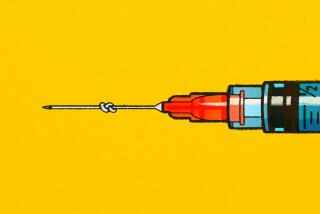Plastic surgery for teens: Too soon?
- Share via
To say I disliked my nose as a teenager would be an understatement. Both its size (too big) and its shape (hooked) made me feel as if I stood out. Though I sometimes fantasized about getting it “done,” a nose job wasn’t something I ever considered seriously. At the time, the plastic surgery boom was just beginning to gain steam and, for the most part, adolescents weren’t on-board. Times have certainly changed.
The American Society of Plastic Surgeons estimates that more than 330,000 adolescents -- most of them female -- underwent cosmetic procedures in 2007. The most popular surgical procedures were nose jobs, breast augmentation, ear reshaping and liposuction.
Of course American teens want to undergo these procedures: They face tremendous pressure to be attractive, and they’re constantly bombarded with images of beautiful men and women who are held up as the norm. “We’ve made a decision about what beauty looks like in this country, and everybody -- teens in particular -- wants to fit the mold,” says Diana Zuckerman, president of the National Research Center for Women and Families, a nonprofit organization that works to improve the health of women and children.
But, in general, cosmetic surgery may not be appropriate for adolescents. After all, altering the way you look before you’re even done developing physically seems almost ridiculous.
Many plastic surgeons argue that cosmetic procedures aren’t just about improving appearances; they make the case that surgery can improve teenagers’ self-esteem too. Because teens take every imperfection (real or perceived) seriously, physical differences, however minor, can influence what they think of themselves and how they behave. Teens can be tough on one another too, and a feature outside the perceived norm -- be it a large nose or a flat chest -- can be the source of teasing and ultimately self-imposed isolation. But no well-designed studies demonstrate that cosmetic surgery significantly changes teenagers’ quality of life. “Although patients who have undergone a cosmetic procedure often do feel better about that particular body part, there’s really no data to suggest that it improves their overall body image or self-esteem,” Zuckerman says.
Studies do show, however, that teenagers naturally begin to feel better about their appearance as they progress through adolescence. Some simply get used to features that they once found bothersome; for others, those features actually change. Skeletal maturity may occur around age 14 to 16, but bodies continue to mature. Girls frequently gain weight or “fill out,” and boys grow more muscular. Unfortunately, patience isn’t teenagers’ strong suit, and the wait can be agonizing, affecting how they see their place in the world. “I’m convinced that there’s a group of teen patients that can be helped by cosmetic surgery,” says Dr. John Canedy, president of the American Society of Plastic Surgeons. “The critical thing is to select them thoughtfully and carefully.”
That’s not always easy. Teens’ ideas of what they want can change quickly -- day to day, sometimes even hour to hour. For that reason, it’s important that a teen have a long-standing and consistent desire to have cosmetic surgery.
The desire must be theirs alone. Surgery should never be a response to pressure from friends or a boyfriend or girlfriend. It also shouldn’t be something they do because parents want them to. “I’ve had parents get very mad at me when I’ve refused to operate on their child,” Canedy says.
Teens need to be mature enough to understand what the surgery can and cannot do for them. A nose job may eliminate a bump and liposuction might slim their hips, but these procedures won’t eliminate problems in their lives.
Although teens legally don’t sign consent for surgery (their parents do), they need to understand the risks involved. “Plastic surgery is still surgery. There are real complications that can happen,” Canedy says. Canedy admits that these conversations take a long time, and he often sees his teenage patients more than once before deciding to move ahead with surgery. “It’s part of my job as their doctor -- not just their plastic surgeon. At some point, you simply have to make sure that the right thing is done.”
More plastic surgeons should be as thoughtful as Canedy in their approach to teens. But, apparently, discouraging patients from having surgery, regardless of their young age, isn’t considered a particularly good business model.
Parents ultimately hold the deciding vote about surgery, and they’re the ones largely responsible for determining what is best for their child.
With a 14-year-old daughter of my own, I recognize how difficult that can be. While I’d like to think that I’d dissuade -- if not forbid -- her from having cosmetic work done, I’m acutely aware of the tremendous forces that our kids face to look perfect.
As far as my own nose goes, I’ve never really grown to love it. I have grown used to it, however, and have no regrets that it was never “fixed.” It’s simply part of who I am. At 44 years of age, my nose is actually the least of my cosmetic concerns -- it’s my aging skin that haunts me now.
--
Ulene is a board-certified specialist in preventive medicine practicing in Los Angeles.
--
(BEGIN TEXT OF INFOBOX)
Surgery won’t cure obsession
Teenagers -- and adults -- seeking cosmetic surgery should first be screened for body dysmorphic disorder. For them, surgery will not be enough to help them achieve what they perceive as perfection.
Both males and females suffering from this disorder are so preoccupied with the way they look, they become fixated on minor flaws in their appearance, losing all perspective.
Their focus goes beyond typical teenage concerns and becomes something of an obsession, interfering with their ability to carry out day-to-day routines and causing emotional distress. Teenagers with the disorder may be unable to concentrate on their schoolwork, or they might choose to avoid social situations like parties or dates.
“People with body dysmorphic disorder don’t do well with cosmetic surgery,” says Dr. Katherine Phillips, professor of Psychiatry and Human Behavior at the Warren Alpert Medical School of Brown University. “They’re often unhappy with the outcome.”
In short, they’re always going to identify a body part that isn’t quite right.
The problem is estimated to affect roughly 1% of the population and typically begins in early adolescence. “BDD often goes undiagnosed,” Phillips says. “A lot of people simply aren’t aware of it. In teenagers, it’s also easy to confuse with normal adolescent concerns about appearance.”
Warning signs
Although teens are often reluctant to talk about the disorder, signs of the condition may be apparent and can include:
* Checking mirrors frequently
* Changing clothes often and/or shopping compulsively
* Spending excessive amounts of time grooming
* Picking at one’s skin
* Wearing too much makeup
* Refusing to appear in pictures
* Avoiding social situations
-- Valerie Ulene






